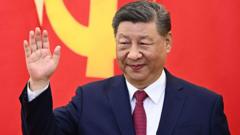This significant extradition highlights the escalating efforts by both countries to tackle organized crime and enhance bilateral security ties.
**Major Drug Lords Extradited: A Turning Point in U.S.-Mexico Relations**

**Major Drug Lords Extradited: A Turning Point in U.S.-Mexico Relations**
In a historic move, Mexico extradites 29 cartel members, including notorious Rafael Caro Quintero, signaling a crackdown on drug trafficking.
The Mexican government has made a substantial decision by extraditing 29 alleged members of drug cartels, which includes prominent figures such as Rafael Caro Quintero, a notorious drug lord with a long history in the narcotics trade. This extradition is heralded as one of the largest in Mexico's history and represents a critical moment for U.S.-Mexico relations, particularly amidst ongoing pressures from the Biden administration for stronger actions against drug trafficking and related violence.
Rafael Caro Quintero is particularly infamous for his role in the 1985 murder of DEA agent Enrique 'Kiki' Camarena. Initially captured and sentenced to 40 years in prison, Quintero's controversial release in 2013 spurred outrage in the U.S. He was recaptured in 2022 by the Mexican Navy and ended up becoming a focal point in the bilateral discussions on combating drug cartels.
Amid the extradition, high-ranking officials in the U.S. government, including Attorney General Merrick Garland, have reinforced their commitment to holding drug traffickers accountable. “Today, we send a message that those who choose violence against our citizens will face justice,” Garland emphasized.
Alongside Quintero, other high-profile cartel leaders such as the Zetas Cartel founders Miguel Angel Treviño and Omar Treviño were also extradited. Known for their brutal reputation, the Treviño brothers were involved in a variety of criminal enterprises, ranging from mass murder to drug trafficking. Law enforcement in Texas has since issued warnings to American citizens about traveling to Mexico due to potential threats from these criminal organizations.
As these extraditions unfold, the implications for the future of drug enforcement in North America remain significant. Experts believe that such decisive actions could potentially weaken the power of these cartels and signify a newfound commitment from both nations to confront the escalating crisis of organized crime and related violence.
Rafael Caro Quintero is particularly infamous for his role in the 1985 murder of DEA agent Enrique 'Kiki' Camarena. Initially captured and sentenced to 40 years in prison, Quintero's controversial release in 2013 spurred outrage in the U.S. He was recaptured in 2022 by the Mexican Navy and ended up becoming a focal point in the bilateral discussions on combating drug cartels.
Amid the extradition, high-ranking officials in the U.S. government, including Attorney General Merrick Garland, have reinforced their commitment to holding drug traffickers accountable. “Today, we send a message that those who choose violence against our citizens will face justice,” Garland emphasized.
Alongside Quintero, other high-profile cartel leaders such as the Zetas Cartel founders Miguel Angel Treviño and Omar Treviño were also extradited. Known for their brutal reputation, the Treviño brothers were involved in a variety of criminal enterprises, ranging from mass murder to drug trafficking. Law enforcement in Texas has since issued warnings to American citizens about traveling to Mexico due to potential threats from these criminal organizations.
As these extraditions unfold, the implications for the future of drug enforcement in North America remain significant. Experts believe that such decisive actions could potentially weaken the power of these cartels and signify a newfound commitment from both nations to confront the escalating crisis of organized crime and related violence.





















